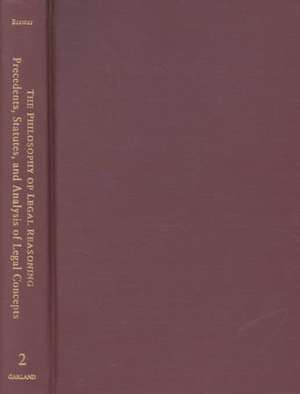Precedents, Statutes, and Analysis of Legal Concepts: Interpretation: Philosophy of Legal Reasoning: A Collection of Essays by Philosophers and Legal Scholars
Editat de Scott Breweren Limba Engleză Hardback – mar 1998
Preț: 1118.04 lei
Preț vechi: 1363.47 lei
-18% Nou
Puncte Express: 1677
Preț estimativ în valută:
213.94€ • 223.82$ • 177.72£
213.94€ • 223.82$ • 177.72£
Carte tipărită la comandă
Livrare economică 03-17 aprilie
Preluare comenzi: 021 569.72.76
Specificații
ISBN-13: 9780815326564
ISBN-10: 0815326564
Pagini: 400
Ilustrații: Illustrations
Dimensiuni: 152 x 229 x 28 mm
Greutate: 0.71 kg
Ediția:1
Editura: Taylor & Francis
Colecția Routledge
Seria Philosophy of Legal Reasoning: A Collection of Essays by Philosophers and Legal Scholars
Locul publicării:Oxford, United Kingdom
ISBN-10: 0815326564
Pagini: 400
Ilustrații: Illustrations
Dimensiuni: 152 x 229 x 28 mm
Greutate: 0.71 kg
Ediția:1
Editura: Taylor & Francis
Colecția Routledge
Seria Philosophy of Legal Reasoning: A Collection of Essays by Philosophers and Legal Scholars
Locul publicării:Oxford, United Kingdom
Cuprins
Some Reflections on the Reading of Statutes *; Determining the Ratio Decidendi of A Case; The Ascription of Responsibility and Rights.; The Judgment Intuitive: The Function of the Hunch 1 in Judicial Decision; Remarks on the Theory of Appellate Decision and the Rules or Canons About How Statutes are to be Construed; Pragmatics and the Maxims of Interpretation; Legal Formalism, Legal Realism, and the Interpretation of Statutes and the Constitution; Case Law and Stare Decisis: Concerning Präjudizienrecht in Amerika *; Tû-Tû †; The Theory of Judicial Precedents.; The Rule of Law as a Law of Rules; Exceptions; The Analysis of Legal Concepts; Fallacies of the Logical Form in English Law; Reasoning in a Circle of Law *; Vagueness in Law and Language: Some Philosophical Issues
Descriere
At least since plato and Aristotle, thinkers have pondered the relationship between philosophical arguments and the "sophistical" arguments offered by the Sophists -- who were the first professional lawyers. Judges wield substantial political power, and the justifications they offer for their decisions are a vital means by which citizens can assess the legitimacy of how that power is exercised. However, to evaluate judicial justifications requires close attention to the method of reasoning behind decisions. This new collection illuminates and explains the political and moral importance in justifying the exercise of judicial power.




